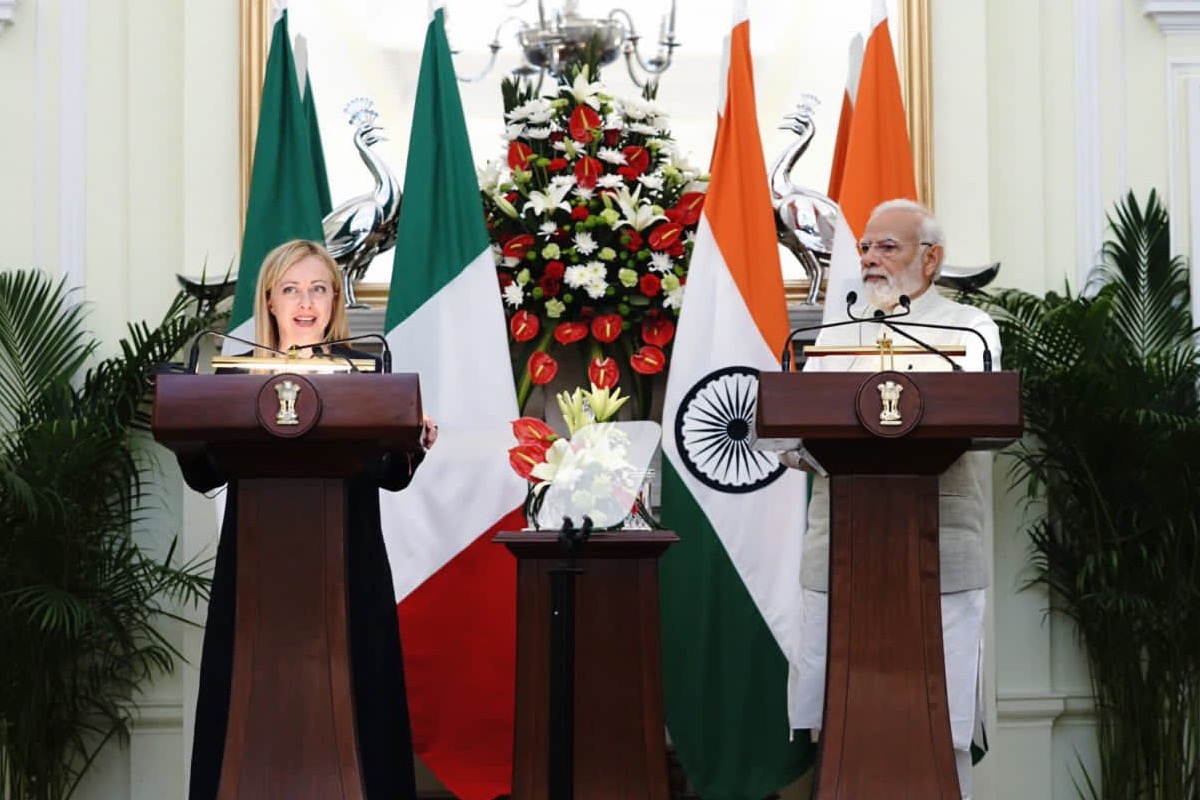Nothing was lost in translation when Prime Minister Narendra and her Italian counterpart Giorgia Meloni addressed the joint press conference following their bilateral summit earlier this month. One speaking in Hindi and the other in Italian – the duo displayed a certain degree of synergy and mutual admiration. That they had hit it off was evident from Meloni’s gesture of calling the Prime Minister “the most beloved leader in the world.”
“I hope to reach, during my term, the heights of approval of the Indian prime minister, known to be the most beloved leader in the world,” said Meloni.
India, and Italy’s relations hit a new high with the countries celebrating the 75th anniversary of their relations. “On this occasion, we have decided to elevate the India-Italy partnership to the status of a strategic partnership,” said Narendra Modi and Giorgia Meloni standing side by side.
Meloni had a rather controversy-free visit and much of the coverage was positive barring some negligible criticism of her sartorial choices and her emphasis on Europe’s Judaeo-Christian roots at the Raisina Dialogue
During the same speech, with Russian Foreign Affairs Minister Sergey Lavrov seated in the audience, Meloni didn’t shy away from reiterating the illegality of the Russian invasion of Ukraine. Her utterances against Russia invited loud applause from the audience.
The speech at the Raisina was earnest but the substantive announcements had already been made. Meloni and Modi had announced the creation of a “Start-up Bridge” between Italy and India with “particular emphasis on increasing cooperation in sectors such as renewable energy, green hydrogen, information technology, semiconductors, telecommunications, and space.”
On the other hand, the two said, the volume of trade between Italy and India has more than doubled in the past two years, reaching a record 15 billion euros by 2022.
About six hundred Italian companies have a presence in India, which has become an increasingly attractive market for both manufacturing and trade thanks in part to the ‘Make in India’ program launched in 2014. Cooperation and trade agreements in the military field were also relaunched, especially after Italy’s Leonardo was ‘unfrozen’ by the import blockade over the now-forgotten Westland-Agusta scandal that has been settled in court.
And the two premiers also announced the establishment on a regular basis of joint exercises and training courses between their respective Armed Forces. India and Italy are also exploring joint productions in the defense and aerospace sectors and technology transfers, as evidenced by the agreement between Italy’s state-owned Fincantieri and India’s Cochin Shipyard Limited.
In addition, India and Italy are part of a joint working group on counter-terrorism.
Changing stance on China
Those who expected Meloni to take an open stance on China, however, were disappointed. The word China was not mentioned even once amid speculations on whether Italy will be able to disengage from the ill-fated Belt and Road Initiative membership.
However, the change in strategic stance on China was evident from Italy joining the Indo-Pacific Ocean Initiative.
“It is a source of great satisfaction for us that Italy has decided to join the Indo-Pacific Ocean Initiative. This will allow us to identify concrete issues to strengthen our cooperation in the Indo-Pacific,” said Narendra Modi.
By joining IPOI, Italy will, together with Singapore, take the lead in the pillar of scientific, technological, and academic cooperation. IPOI is a New Delhi-sponsored initiative to strengthen cooperation in maritime transport and trade connectivity, maritime security, marine ecology and resources, disaster risk reduction and management, science and technology, and academic collaboration. The announcement of Italy’s membership was somewhat expected as an Italy-India-Japan ‘trilateral partnership’ had been concluded in 2021 and from reports of Rome sending patrol ship Morosini to the Indo-Pacific, just before Meloni’s arrival.
Meloni’s India visit ends a long season, lasting nearly a decade, of uncertain and difficult relations between Italy and India. Due to the unfortunate (and mismanaged) issue of two Italian marines who had killed two Indian fishermen off the Indian coast but, above all, to the cumbersome ghosts that had been hovering in the room for much longer whenever the word Italy was mentioned in India.
The agreements reached between Meloni and Modi, and the invitation as guest of honor at the Raisina Dialogue, are certainly the result of a long diplomatic work carried out in recent years, which began in 2017 with the visit to India by then-Premier Gentiloni and gradually continued with Giuseppe Conte’s visit in 2018, and the meeting between Modi and Mario Draghi on the sidelines of the G20 in 2021.
Above all, there is a sign of significant change at the political level. But the biggest achievement probably is the significant easing of the political tension, helping the two countries engage with greater freedom and trust at the diplomatic and strategic levels.










